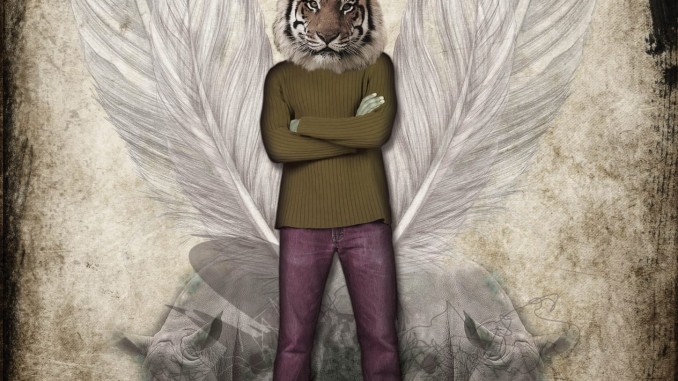
Lacks Bite [by James Wenley]
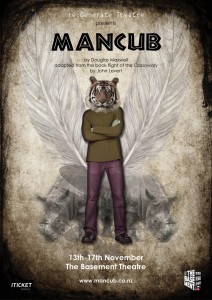
Mancub tells the familiar story of teenager’s rite of passage from adolescence to manhood. Paul (Ryan Dulieu) traverses the terrain of teachers, parents, his first girlfriend, and school sport. There is one major complication: Paul begins to take on the characteristics of different animals, and eventually believes he can turn into animals at will.
Scottish playwright Douglas Maxwell’s script debuted at the Soho Theatre in London in 2005, adapted from the book Flight of the Cassowary by John LeVert. It has been tooled towards an Auckland setting for its Basement production.*
Dulieu is onstage for the play’s entirety; for this teenager, the play’s universe certainly revolves around him. He’s a charismatic guide to the inside of his troubled head, revealing a mix of neurosis, hormonal confusion, and a philosopher’s mind, credibly delivered by Dulieu. Perhaps betraying the play’s book origins, the script is heavily told through Paul’s first person narrative of the events, people and feelings in his life. When sensorially connected, he is a formidable force that we pay attention to, especially when his character is allowed the rare opportunity to stop speaking and communicate physically.
Paul is called a sloth, a pig and a parasite by his parents within the first minute. After reading a (children’s) book on animals, he begins to notice animal traits in himself and others. The trend continues at school, learning we have more in common with animals than we do opposite. “What animal am I?” he ponders.
Dulieu is joined by Toi Whakaari graduates Tansy Hayden and Richard Osborne who between them take on the entire supporting cast of characters (and the odd animal) in Paul’s life. Many are performed in broad, zany strokes, like Paul’s oddball parents. It takes a while for the actors and indeed for me to settle into the playing style: changes are rapid, and more work needs to be afforded to articulation within the Studio setting. Osborne’s most memorable roles are a mad fanatical soccer coach, and an endearing dog Ken who relates on all-fours the unique canine experience. He is also intriguing as best friend Jerry, who comes with his own set of problems. Hayden transforms the role of Karen, who at first seems like a clichéd love interest and teenage boy’s dream, into a fully rounded and believable character. I understand that in Maxwell’s script no lines are assigned individually to the characters so the director and cast have done an excellent job of finding their own unique way through.
The play then is told in a theatrical style with Paul’s direct commentary to the audience and repeated character changes, but frustratingly, it is not theatrical where it truly counts. The monologue is privileged; we are often told rather than shown – in a key turning point for the character, Paul narrates that he turns into a rat. That idea comes with many theatrical possibilities, but we don’t see it. Paul shouts out words to describe his mental state: “agitated!” This appears to be a failing at times of Maxwell’s script, which contains some quite evocative poetic ideas, but has a tendency with Paul to over-tell. It does not excuse the director for static physical images; the dialogue can only do so much of the heavy lifting and it positively roars out for the actor’s physicality to be pushed even further. Johnston does rise to the challenge of soccer games and the final soaring image of the play.
The set, designed and built by Nick Greer, is immediately curious. Covering the expanse of the Studio width, it contains panels, windows, and seats that pop out and open to be used in surprising way by cast and crew. In its effect, it reminded me a lot of the recent production of Bucket Boy: both were impressive feats within the challenging at the best of times Studio space (not to mention the uneven floor). Coming in, the Studio stairs are covered in jungle leaves watched over by a stuffed possum. Inside, on the sides of the stage are shrubbery and more animals, but this feature wall is white washed with garish coloured panels – an uncertain design statement, revealing little of Paul’s mindset, however practically innovative.
The direction never settled on a definitive tone for Mancub. Not consistently funny for the comedy that the early broad playing style suggested, nor psychologically clever enough for a metaphoric drama, nor suggestive enough of the surreal fantastic wonder of ‘magic realism’. There is some good material on the human/animal mating behaviour, the build up of adolescent energy and frustration with the world, and an abundance of animal facts, but like Paul, its identity remained uncertain. The Samsa-esque animal metamorphosis is exciting, whereas Paul’s ‘everyday’ storyline is humdrum. At one point, his friend Jerry, who takes pills and is the subject of parental abuse, questions why the animal phenomenon happens to Paul and not him. It is a good question: Paul’s wild side just seems to come out of his animal obsession and a ball busting sports injury, rather than anything extraordinary in his life to motivate it. Giving the animal transformation to a Jerry type character as a reaction to more dramatic events, may have made for a more psychologically rich drama. As it stands, this is a by the book metaphor for late puberty, with animals.
This is the first production by re:Generate Theatre. They say in their program they want to “create events that appeal to a young and exciting audience with the ultimate goal of creating a rock concert buzz and interaction with a theatrical even [sic], this is the first step”. Laudable goals, but to create that rock concert buzz they are going to need to communicate much more dramatically immediate work than Mancub. Throughout the play, I couldn’t help but feel I’d already seen a much better take on similar themes. Indeed I have: Tigerplay by Gary Henderson, revived for ATC’s Young & Hungry 2011, against which Mancub struggles to compete.
*The change of setting to Auckland is not entirely successful. The zoo referenced in the play is described as being an hour away and does not correlate in the slightest to Auckland Zoo. The school system and obsession with soccer is recognisably British. Director Bryan Johnston may have done better sticking to the original setting rather than pandering to a forced NZness – while Dulieu speaks in his natural accent, some of the ensemble characters by actors Hayden and Osborne take on a British lilt.
Mancub is presented by re:Generate Theatre and plays at The Basement Studio until 17th November. More details see Mancub.co.nz
SEE ALSO: Theatreview.org.nz review by Nik Smythe

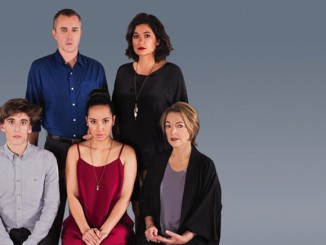
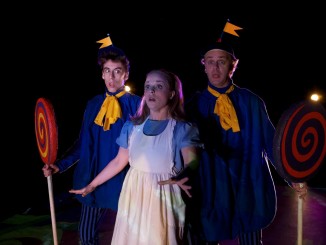
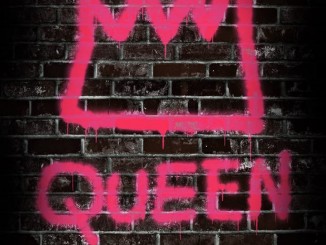
Leave a Reply